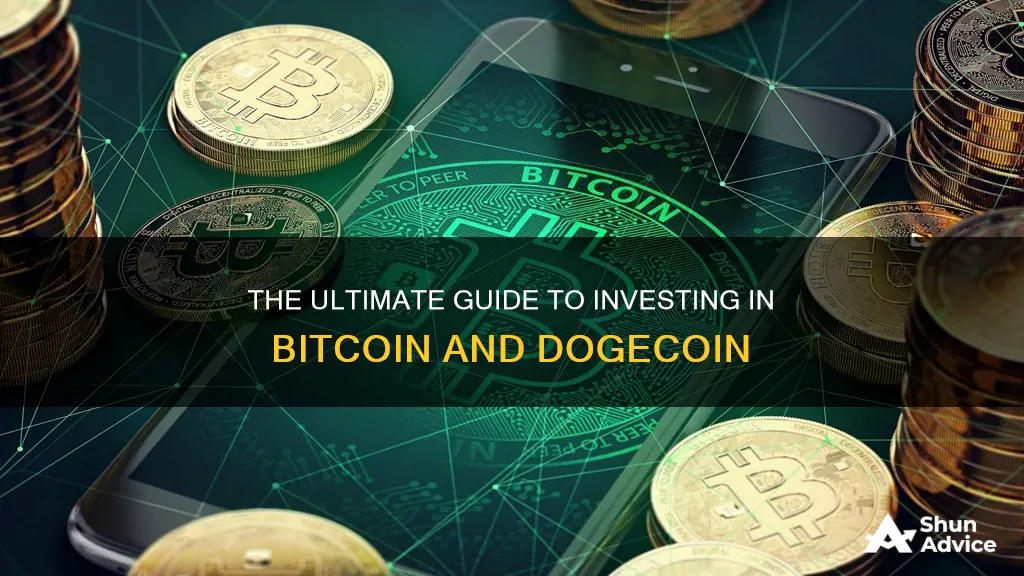
Bitcoin and Dogecoin are two well-known cryptocurrencies with distinct features and investment prospects. Bitcoin, introduced in 2009, is the original decentralised cryptocurrency, intended to function as digital cash and act as an alternative to traditional currencies and banking systems. On the other hand, Dogecoin, created in 2013, started as a joke based on the Doge meme, and its low price and inflationary supply make it a highly speculative investment. This paragraph will discuss the key differences between these two cryptocurrencies and provide an overview of their investment potential.
What You'll Learn

Understanding the basics of Bitcoin and Dogecoin
Bitcoin and Dogecoin are two well-known cryptocurrencies. However, they have distinct roles with different thesis drivers. Bitcoin is a decentralized digital currency that you can buy, sell, and exchange directly with others without intermediaries and in a "trustless environment". Dogecoin, on the other hand, is a "meme coin" that was created as a joke based on a popular internet meme of a Shiba Inu dog.
Both Bitcoin and Dogecoin use a proof-of-work consensus algorithm, where miners use computers to solve equations to process transactions and record them on their respective blockchains. However, there are some key differences between the two cryptocurrencies.
One of the biggest differences is that Bitcoin has a hard-coded cap of 21 million BTC, giving it deflationary properties as demand grows while new supply dwindles. On the other hand, Dogecoin has no supply cap, with over 130 billion DOGE already in circulation and an additional 5 billion new coins minted annually. This unlimited supply discourages treating DOGE as a scarce store of value and promotes more stable valuation ranges in the long term.
Another difference is in the transaction speed and cost. Dogecoin transactions are much faster and cheaper than Bitcoin transactions. Dogecoin's blockchain processes a new block of transactions every minute, while Bitcoin's blockchain processes a block every 10 minutes. This makes Dogecoin more desirable as a means of exchange but less desirable as a store of value.
In terms of security, Bitcoin is considered more secure than Dogecoin. The Bitcoin network is more secure than the Dogecoin network by many orders of magnitude due to constant upgrades and technical progress. Additionally, the hashrate of BTC is more than 238 ExaHash per second (EX/s), while the hashrate of DOGE is around 540 TeraHash per second (TH/s).
When it comes to investing, Bitcoin is considered a long-term investment asset, while Dogecoin is seen as a risky, speculative investment. Bitcoin has gained formal backing for its digital gold and store-of-value investment thesis, with many well-known companies adding billions of dollars worth of BTC to their corporate treasury reserves. Dogecoin, on the other hand, lacks institutional adoption and relies heavily on community enthusiasm and social media hype to drive engagement and valuation.
The Ultimate Investment: Bigger Than Bitcoin?
You may want to see also

Pros and cons of investing in Dogecoin
Dogecoin, founded in 2013, is one of the largest cryptocurrencies in the world by market cap. It has gained popularity due to its friendly and enjoyable nature, with a cute Shiba Inu dog on the face of its "coin". Here are some pros and cons of investing in Dogecoin:
Pros
- Dogecoin has a devoted community that is kind, generous, and welcoming to newcomers.
- Dogecoin has faster confirmation times and lower transaction fees compared to other cryptocurrencies like Bitcoin.
- Dogecoin is more approachable due to its light-hearted branding and lower value, which is advantageous for smaller transactions, tipping, and gaming currency.
- Dogecoin is accepted as a form of payment by several merchants and stores worldwide, including the Tesla and Dallas Mavericks merchandise stores.
- Dogecoin is traded on most of the largest cryptocurrency exchanges, such as Coinbase, Binance, and Crypto.com, making it one of the most accessible cryptocurrencies.
- Dogecoin has significantly lower fees than other networks like Bitcoin and Ethereum due to lower traffic and a shorter block time.
- Dogecoin is transitioning to a proof-of-stake blockchain, which will boost transactions per second and provide additional utility through staking rewards.
Cons
- Dogecoin has lower network security compared to other cryptocurrencies, and fewer payment processors and vendors accept it.
- Dogecoin's value is highly volatile and susceptible to significant price fluctuations.
- Dogecoin's supply is not capped, and it will never stop increasing. This inherent inflationary trend may be a concern for investors.
- Dogecoin may be susceptible to pump and dump schemes as only a few wallets own the majority of Dogecoin.
- As a cryptocurrency, Dogecoin is not controlled by any government or financial authority, and its anonymous nature makes it susceptible to money laundering and tax evasion.
- Dogecoin's future growth is uncertain, and it faces competition from other cryptocurrencies that are gaining popularity, such as Ethereum, Litecoin, and Ripple.
Schwab's Guide to Buying Bitcoin
You may want to see also

Pros and cons of investing in Bitcoin
Bitcoin is the oldest and most traded cryptocurrency. It is highly liquid, transparent, and relatively safe. However, investing in Bitcoin is also volatile, energy inefficient, and lacks proper regulatory oversight. Here is a more detailed breakdown of the pros and cons of investing in Bitcoin.
Pros of Investing in Bitcoin:
- Poignant: As the first-ever cryptocurrency, Bitcoin has led to the creation of thousands of alternative coins, making it a prestigious and desired asset.
- Decentralised: There are no centralised authorities or central banks that may impose high fees or restrictions. Bitcoin is also global, so there are no exchange rates to deal with.
- Accessibility: To invest in Bitcoin, you don’t need a fortune or credit history. This gives an alternative to people who distrust their government or live in restrictive places with limited access to financial services.
- Liquidity: Bitcoin is among the most liquid investment assets, so traders can either trade Bitcoin for other assets in the short term or buy and hold Bitcoin for long periods.
- Transparency: Bitcoin is a decentralised platform and a public ledger that allows everyone to see transactions as they are stored permanently on the blockchain.
- Portfolio Diversification: Bitcoin can help investors spread investments and reduce exposure to risks.
- Hedge Against Inflation: Due to its supply cap of 21 million coins and decentralised nature, some believe Bitcoin is immune to economic turmoil, geopolitical problems, and inflation.
- Business Features: Bitcoin has various features, such as multi-signature authorisation, that can improve transparency and security in business settings.
- Return on Investment: Figures show that Bitcoin has a significant ROI compared to other assets.
- Backed by Major Investors: Huge names have become major investors in Bitcoin, including Michael Saylor, CEO of MicroStrategy, and Mark Cuban, who claims that 60% of his crypto holdings are BTC.
- Safety: Despite horror stories of hacks and scams, Bitcoin is the safest cryptocurrency to invest in due to its high number of global users, which help to decentralise the network.
Cons of Investing in Bitcoin:
- Volatility: One of the biggest drawbacks of Bitcoin is its extreme price volatility, making it a risky investment.
- Slow Transactions: Many users are frustrated with Bitcoin's slow processing times, which can take up to 10 minutes.
- Limited Use: Bitcoin has limited use and depends on internet availability. Compared to other coins like Ethereum, Bitcoin is mostly limited to financial transactions.
- Not 100% Safe: While Bitcoin’s blockchain is almost unhackable, Bitcoin can still be stolen if held on an exchange.
- Lack of Regulation: There is little regulatory oversight in the Bitcoin market, which can lead to fraud and scams.
- Misunderstood: Despite its innovative technology, Bitcoin is still veiled in misconception and associated with illegal services and crypto scams.
- Energy Inefficient: Bitcoin uses a proof-of-work mechanism to validate transactions, consuming a large amount of power, which is harmful to the environment.
- Community Disagreements: Community disagreements have led to splits in the Bitcoin community, creating Bitcoin Cash and Bitcoin SV. Such splits can be discouraging for investors.
- Quantum Computers: The development of quantum computers could pose a threat to the Bitcoin network by performing a 51% attack and rendering it useless.
- Doesn't Work as Intended: Bitcoin was designed to be a digital way to transfer value, but today, many people just hold it because they believe it will increase in value.
In conclusion, investing in Bitcoin offers numerous potential advantages, but it is also a high-risk venture with several drawbacks. It is essential to carefully consider these pros and cons before deciding whether to invest in Bitcoin.
Smart Ways to Invest Your $100 in Bitcoin Monthly
You may want to see also

How to buy Bitcoin and Dogecoin
Step 1: Research the Cryptocurrencies
Before investing in any cryptocurrency, it is important to understand the associated risks and volatility. Both Bitcoin and Dogecoin are highly volatile investments and should only be purchased if you are in a strong financial position and can afford to lose the money you put in.
Step 2: Decide on an Exchange
To purchase Bitcoin or Dogecoin, you will need to open an account with a cryptocurrency exchange. Some popular exchanges include Coinbase, Kraken, Binance, and Robinhood. These platforms allow buyers and sellers to meet and exchange cryptocurrency for dollars.
Step 3: Sign Up and Verify Your Account
Once you have chosen an exchange, you will need to sign up and create an account. This typically involves providing a valid ID and proof of address. The verification process may take some time, depending on your location.
Step 4: Add a Payment Method
To start trading, you will need to add a payment method to your account. Most exchanges accept bank accounts, debit cards, or wire transfers. Some also support Google Pay, Apple Pay, PayPal, and credit cards.
Step 5: Place Your Order
Once your account is set up and funded, you can place your order for Bitcoin or Dogecoin. Search for the cryptocurrency by name or ticker symbol (BTC for Bitcoin, DOGE for Dogecoin) and input the amount you wish to purchase.
Step 6: Consider Your Storage Options
When you buy cryptocurrency, it is typically stored in your exchange's crypto wallet. However, for added security, you may want to consider transferring your coins to a separate crypto wallet. There are two main types of wallets: hot wallets and cold wallets. Hot wallets are digital and always connected to the internet, making them more convenient but potentially more susceptible to hacking. Cold wallets, on the other hand, are physical hardware devices that can be disconnected from the internet, making them less convenient but more secure.
Important Things to Keep in Mind:
- Invest with caution: Cryptocurrencies are very risky investments. It is recommended that you only invest an amount you are willing to lose.
- Understand the unique characteristics: Unlike Bitcoin, Dogecoin has an unlimited supply, which means its price relies on buyers constantly purchasing new coins to maintain its value.
- Be aware of fees: Different exchanges and payment methods may have varying fees associated with buying and selling cryptocurrencies.
- Do your research: It is important to thoroughly research any investment before putting your money in. Understand the risks, volatility, and unique characteristics of each cryptocurrency.
TD Ameritrade: Buying Bitcoin Investment Trust Guide
You may want to see also

How to store Bitcoin and Dogecoin
When you buy Dogecoin, it is usually kept in your exchange's or brokerage's crypto wallet by default. Since these wallets are generally connected to the internet, some investors choose to withdraw their crypto and store it in a separate wallet.
You can store your Dogecoin in a hot wallet or a cold wallet outside of your exchange. Hot wallets are digital and connected to the internet, while cold wallets are physical hardware that you can disconnect, making them much less susceptible to hacking.
Cold wallets are generally more expensive than hot wallets, and there is a greater risk of being unable to access your cryptocurrency if you lose or forget the password to your cold wallet.
If you want to store your Bitcoin offline, you can use a hardware wallet, which is a physical device that looks like a USB drive and connects to your computer or mobile device. You can also use a paper wallet, which is a piece of paper that contains the information necessary to access your Bitcoin.
The Ultimate Guide to Investing in Bitcoin
You may want to see also
Frequently asked questions
You can buy Bitcoin through a cryptocurrency exchange or a traditional stockbroker. You can also use peer-to-peer money transfer apps like PayPal, Venmo, or Cash App, or a Bitcoin ATM.
You can store your Bitcoin in a hot wallet or a cold wallet. A hot wallet is connected to the internet and is faster for transactions, while a cold wallet is offline and offers more security.
Dogecoin is highly volatile and unpredictable, and there is no limit on how many Dogecoins can be mined. It doesn't pay dividends or interest, and it isn't backed by any substantial assets.
You can buy Dogecoin through a crypto exchange like Coinbase, Binance, or Kraken, or through an investment app like Robinhood, SoFi, Webull, or eToro.
Dogecoin is easier to mine than Bitcoin, and it has the potential for massive returns. It also has a dedicated community and a playful, lighthearted brand.







